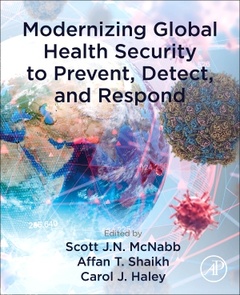Modernizing Global Health Security to Prevent, Detect, and Respond
Coordonnateurs : McNabb Scott J.N., Shaikh Affan T., Haley Carol J.

Modernizing Global Health Security to Prevent, Detect, and Respond explores?through thoughtful, thorough, and diverse scientific review and analyses?factors that have led to recent public health emergencies and offers a vision for a better protected global environment. The authors consider the history of global health security, governance, and legal structures with an eye toward novel approaches for the present and future. The book presents a vision for a more protected and safer global public health future (with the actions needed to achieve it) to prevent, detect, and respond to (re)emerging threats. Its aim is to chart a way forward with the understanding that future pandemics must and can be prevented. Major topics examined from a public health perspective include global health security; the growing concept of One Health; epidemic and pandemic prevention, detection, and response; reviews of past (e.g., Ebola, MERS-CoV, Zika, and COVID-19) public health emergencies of international concern; roles of information and communication technology; humanmade public health threats; and legal and ethical issues (e.g., viral sovereignty, trust, and transparency). Modernizing Global Health Security to Prevent, Detect, and Respond provides the academic substance and quality for researchers and practitioners to deeply understand the why of health emergencies, and most importantly?what we can and should do now to prepare.
1. Vision Guiding Modernization of Global Health Security
Section I International Regulatory Environment to Prevent, Detect, and Respond2. Ethics and Global Health Security3. National Interagency Collaboration for Public Health4. The imperative for global cooperation to prevent and control pandemics 5. International Legal Issues of National Sovereignty and Authority Impacting Global Health Security
Section II Global One Health to Address Pandemics - Ecological and Biological Challenges in the Dynamic Planet6. (Re-)emerging Viral Zoonotic Diseases at the Human-Animal-Environment Interface7. EEmergence and Dissemination of Antimicrobial Resistance at the Interface of Humans, Animals, and the Environment8. Toxic and Environmentally Ubiquitous Chemical Agents9. Global Climate Change Impacts on Vector Ecology and Vector-borne Diseases10. Assessment of Critical Gaps in Prevention, Control, and Response to Major Bacterial, Viral, and Protozoal Infectious Diseases at the Human, Animal, and Environmental Interface11. Urbanization, Human Societies and Pandemic Preparedness and Mitigation
Section III People and Goods on the Move12. The Interconnected World of Trade, Travel, and Transportation Networks13. Mitigating Negative Economic Impacts of Pandemics14. Health Measures at Points of Entry for Prevention15. Rights-based Global Health Security through all-hazard risk management
Section IV Tools and Techniques to Modernize Prevention, Detection, and Response16. Global Laboratory Systems17. Modernizing Public Health Surveillance18. Creating One Health, Integrated, and Informatics-Savvy Health Organizations 19. Analytics and Intelligence for Public Health Surveillance20. Tools and Techniques for Modernizing Prevention, Detection, and Response 21. Countering Vaccine Hesitancy
Section V Moving to the Best-protected Global Community22. Science and Political Leadership in Global Health Security23. Influence of Finance and Philanthropy24. Enhancing Trust and Transparency in Public Health Programs25. Workforce Development26. Advancing Conceptual and Practical Links between Health System Preparedness and Long-term Benefits to Achieve Health Security 27. Measuring Progress of Public Health Response and Preparedness
- Highlights (re)emerging past and future threats to public health (e.g., climate change, antibiotic resistance, failures of societal sectors to work together)
- Discusses new visions for global health security in each chapter
- Considers how to leverage technological innovations to advance public health
- Includes practical examples through case studies from around the world
Date de parution : 10-2023
Ouvrage de 570 p.
19x23.3 cm



